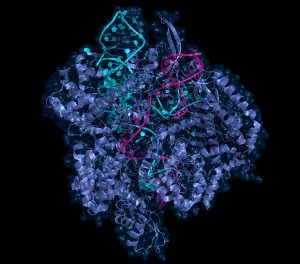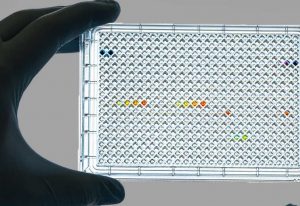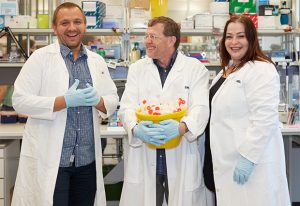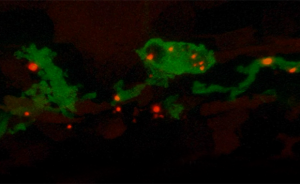
New therapies to improve cardiovascular health
Science & Technology EMBL researchers have made new strides into understanding and reversing genetic defects that underlie familial heart disease.
2023
sciencescience-technology

Science & Technology EMBL researchers have made new strides into understanding and reversing genetic defects that underlie familial heart disease.
2023
sciencescience-technology

Lab MattersPeople & Perspectives Scientists have the technology to edit the human genome. But when should they, and who contributes to these decisions?
2023
lab-matterspeople-perspectivesperspectives

Science & Technology EMBL researchers, in collaboration with BD Biosciences, have demonstrated a new technology that allows rapid image-based sorting of cells. The new technology represents a major upgrade to flow cytometry and has applications in diverse life science fields.
2022
sciencescience-technology

Lab Matters EMBL's science education department makes the latest scientific research more accessible for teachers and students.
2021
eventslab-matters

Science & Technology The genome editing tool CRISPR–Cas9 – which plays a critical role in EMBL’s research – was recognised by the Nobel Prize in Chemistry.
2020
sciencescience-technology

Science & Technology Scientists at EMBL Heidelberg have investigated stem cells and how they differentiate to become neurons. Their approach included an assessment of the complex interplay of molecules during the differentiation process and generated fundamental new insights into the role of a protein called Sox2 in…
2020
sciencescience-technology

Science & Technology A study conducted by the Hackett group at EMBL Rome has identified key factors controlling the complex system of gene regulation during early embryo development, shedding new light on the mechanisms behind these events and on their evolutionary implications. Their findings are published in Nature…
2020
sciencescience-technology

Science & Technology EMBL scientists develop a new molecular tool to prevent SARS-CoV-2 infection in mice. This tool is able to cause targeted epigenetic modifications of specific genes in specific cell populations. They will use it in mice to target airway cells that express the ACE2 protein – the receptor that…
2020
sciencescience-technology

Science & Technology Scientists at EMBL Heidelberg have developed a new method, called Targeted Perturb-seq (TAP-seq), which increases the scale and precision of functional genomics CRISPR–Cas9 screens by orders of magnitude. Their method overcomes limitations in previous applications of single-cell RNA sequencing,…
2020
sciencescience-technology

Science & Technology Researchers from the Sharpe group at EMBL Barcelona have published a method to track the developmental history of a cell using the gene editing tool CRISPR–Cas9, but without the need to create transgenic organisms.
2020
sciencescience-technology

Science & Technology EMBL scientists examine the molecular causes of a rare hereditary disease of the spine and ribs
2020
sciencescience-technology

EMBL Announcements Committee recognises outstanding contributions of EMBL alumni to science journalism and genome editing
2020
alumniembl-announcements

Science & Technology Exploring the diverse routes by which EMBL scientists are driving forward neurobiology
2019
sciencescience-technology

Science & Technology What CRISPR may bring for the future of biology, and how it is used at EMBL
2019
sciencescience-technology

Science & Technology Large CRISPR screen prioritises hundreds of promising genes for personalised cancer treatment
2019
sciencescience-technology

Lab Matters EMBL’s GeneCore steps up to discover the facts and settle disputes
2018
lab-matters

Science & Technology ERC grantees Wolfgang Huber and Oliver Stegle share their vision for the next 10 years
2018
sciencescience-technology
Science & Technology How embryonic stem cells develop into the germ line
2018
sciencescience-technology

Science & Technology Real-time tracking of proteins during mitosis is now possible using a 4D computer model
2018
sciencescience-technology

Science & Technology New platform transforms CRISPR gene editor into precision tool
2018
sciencescience-technology

Science & Technology New study by Paola Kuri and Maria Leptin shows how inflammation happens in zebrafish in real time
2017
sciencescience-technology

Science & Technology Emmanuelle Charpentier sheds light on how CRISPR–Cas9 went from side project to global revolution
2016
sciencescience-technology

Science & Technology Study of mouse embryonic stem cells reveals new genes involved in the stem-cell regulatory network.
2015
sciencescience-technology

Lab Matters EMBL scientists regularly receive prestigious awards – meet the latest honourees.
2015
lab-matters

Science & Technology Focusing on basic research is crucial for the development of more advanced genetics techniques
2014
sciencescience-technology
No matching posts found
Looking for past print editions of EMBLetc.? Browse our archive, going back 20 years.
EMBLetc. archive